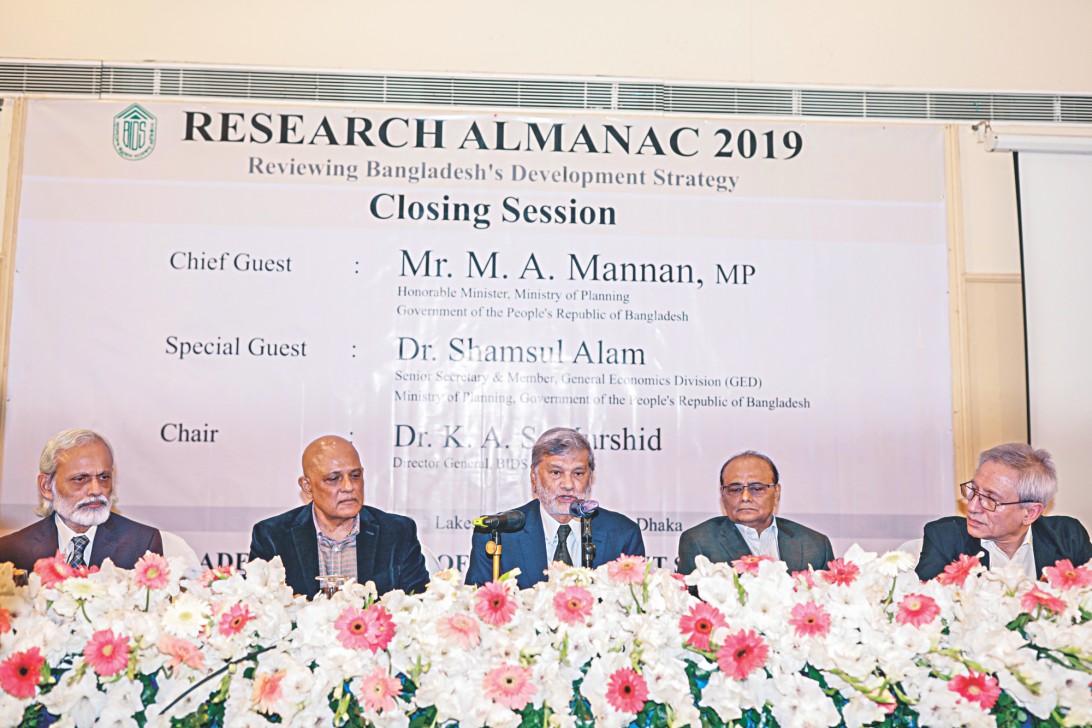Good governance needed to keep up growth momentum

Good governance is compulsory to keep up the higher GDP growth trajectory and spread equally the benefits of the steady economic expansion, said economists yesterday.
They said the economic growth would not be sustainable without good governance in social, political and economic spheres.
In order to become a developed nation as targeted by the government, the country needs two instruments: one is GDP growth and the other is good governance, according to Zahid Hussain, a former lead economist of the World Bank in Dhaka.
“Growth is the wheel and good governance is the driver. Whether GDP growth rate is capable of bringing economic development will depend on good governance.”
His views came at the closing session of the two-day BIDS Research Almanac 2019 at the Lakeshore hotel in Dhaka. The Bangladesh Institute of Development Studies (BIDS) organised the event.
Hussain said the growth in gross domestic product (GDP) is necessary but not sufficient for the economic development of a country.
“To get the growth, we need infrastructure. We need human capital. We need to strengthen macroeconomic stability,” he said, adding that the country also needs to strengthen its resilience to fight global shock, climate change and environmental pollution.
Planning Minister MA Mannan said every growth of GDP is good. However, all the people of Bangladesh are not getting the results of the growth as it is “unregulated”.
Distortions prevail in some spheres, so the results of the growth are waning by way of capital flight and by some other ways, he said.
“I think, as I’m a pessimist, Bangladesh is not going to be a rich nation like Australia and Germany due to some non-economic reasons.”
The minister did not elaborate the factors.
“If people can have three meals a day and shelter at night and the country can ensure a sustainable growth rate, then I would be happy,’’ he said. The minister, however, said the government’s efforts to turn Bangladesh into a developed nation would continue.
About political governance, Mannan said the winner doesn’t leave any space for others. “We are the winner and the winner takes it all. People give us the right.”
KAS Murshid, director general of the BIDS, said Bangladesh has been successful in keeping macroeconomic stability in the last couple of years. However, some problems have surfaced.
“So, reforms are necessary and they are easier than ensuring good governance.”
He said regulatory bodies lack good governance which impact development. “The government should emphasise ensuring good governance at regulatory bodies.”
Murshid called for emphasis on the agriculture sector. He said the country should formulate a policy on how to adopt innovative technologies.
Rizwanul Islam, a former special adviser of the International Labour Organisation, said the country needs economic growth along with equality, adequate jobs, and improved standard of living for its people.
“We don’t want a higher growth only because it is not the lone benchmark of development,” he said.
Islam said private investment in the country has been stagnant for the last couple of years. Economic inequality is rising and the growth of job creation is falling. Revenue compared to the GDP is also reducing.
“In these circumstances, a strategy should be formulated so that the country doesn’t fall into the middle-income trap or premature industrialisation.”
The strategy will be a guide to attract private investment and foreign direct investment, ensure universal quality education, adopt technology, and keep the macroeconomic indicators stable, he added.
Binayak Sen, research director of the BIDS, said the economy is heading in the right direction in some ways. If the present growth rate continues for another 10 years, the poverty rate may drop to 3 percent though inequality exists. He said the poverty rate is going down but people are falling into time poverty.
“Some people do not have enough time for rest and leisure and they spend most of their time working, whether in the labour market, at home, or for others.” Sen recommended ensuring good governance prioritising timely infrastructure development and reducing defaulted loans in the financial sector.
Zaidi Sattar, chairman of the Policy Research Institute of Bangladesh, said, “We have to draw up policies to integrate with the world economy.”
“Without trade at international level and integrating with the world economy, 8 percent growth would not be sustainable,” he pointed out.
The economist said Bangladesh’s export basket relies largely on one product, which is garment, although it is exporting almost 1,400 products now.
“The government should promote the exports of other products.”
